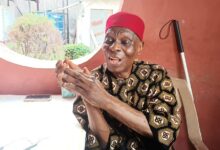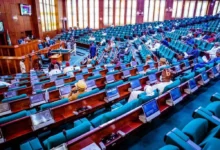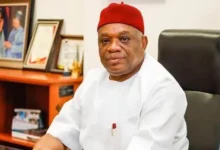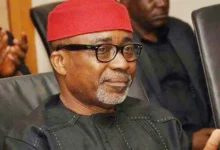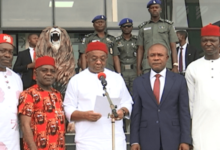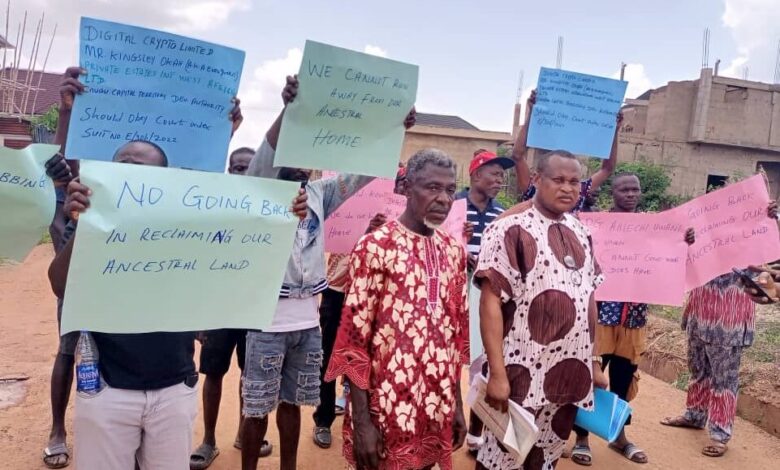
Enugu Government Ignores Invasion of Property Intended For State Varsity
The many hectares of land that the neighboring communities of Obeagu Awkunanaw and Amechi Uwani donated to the former Anambra State in order to construct the main campus of ASUTECH—the Anambra State University of Science and Technology—have since been converted to private estate development, and this has caused tension between the donors and the state. The resulting disagreement on the true extent of the land is one of the controversial topics that Ben Aroh looks at in this study.
The Centenary City Idea
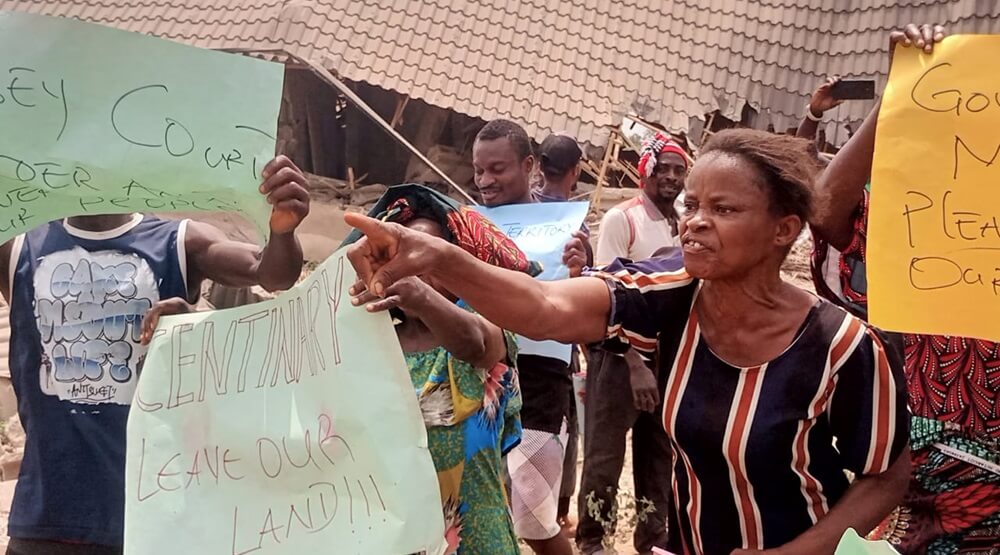
Former Governor Sullivan Chime was the brains behind the plan for the Enugu Centenary City. It was a reimagining of Nigeria’s 2014 Centennial celebration, which commemorated the union of the protectorates of southern and northern Nigeria on January 1, 1914. During the administration of former state governor Senator Jim Nwobodo, the area where the Centenary is located was originally intended to be used for the construction of ASUTECH’s main campus.
Developing disparities
One of the main concerns now is the amount of land provided. Sunday Udeh, a local resident, stated, “It was 318 hectares of land.” There was no sign of the university. All of a sudden, word spread that a private developer had been granted permission to construct private estates on the same site. Not only that,
Amechi native Senator Jim Nwobodo has outlined his own portion of the agreement. “I thought that having a university in my homestead would ensure the advancement of my people,” he stated, about forty years ago. I made an attempt, but unfortunately! I was unable to finish the acquisition and development procedure prior to the October 1983 government change. A few years later, the university was moved to Agbani by Governor Chimaroke Nnamani, realizing that dream. It hurts to think that the land being protested is the land that was originally intended for that project.
Regarding the land’s precise dimensions, Nwobodo declared, “I tried to purchase 318 hectares in Amechi, not 1,097 hectares. The acquisition was attempted for the greater good of the public and not for any private real estate investment.
Nwobodo also took issue with the state government’s alleged gazette on the property. “The Anambra State of Nigeria official gazette number 12, Vol II of March 27, 1986 is ineffectual,” he claims, because it lacked the authority of Samson Omeruah, the state’s military governor at the time. Since Enugu State was established in 1991 and Enugu State University of Science and Technology was established subsequent to Enugu State’s creation, the survey plan (PLAN EN(A)594) that was allegedly created in 1985 is fictitious, invalid, and was not actually created in 1985.
In a statement, the Obeagu community supported Nwobodo’s assertions. The release said, “Senator Nwobodo commissioned for survey works pursuant to the acquisition of an estimated 318.560 hectares of land in certain kindred families in Amechi Uwani and Obeagu Awkunanaw,” characterizing the rumors surrounding Centenary City as “half-truth” and “outright falsehood.” A preliminary survey covering 318.560 hectares was completed and approved on March 8, 1982, by M.U.C. Obi, the Surveyor General at the time. Tracing number for the survey was MISC AN-53.
In 2009, a private company operating under the government-sponsored New Township Development Joint Venture began razing economic trees and residential areas that stood in the way of their proposed development. In the process, they attempted to forcibly seize from us more than 1,097 hectares of ancestral lands that were partially owned by the Amechi Uwani and Obeagu Awkunanaw communities.
In 1985, the survey plan was increased to 1,097 hectares and, curiously and miraculously, without our knowledge, rewritten to bear PLAN No. EN (A) 594 in favor of Enugu State University of Technology. Why was it possible for Enugu State, which was established in 1991, to own land and have a survey plan under the name Enugu State University of Technology before 1991? Again, since Enugu State had not been established prior to 1991, it begs the question of why the plan number purportedly approved in 1985 had the letters “EN” for a state that had not yet been established in 1985.
There was a significant inconsistency in the cited Gazette No. 12, dated March 27, 1986, which was ostensibly signed by Charles Chika Chime, Commissioner for Works, Lands and Transport, Anambra State, on behalf of Navy Captain Allison Amaechina Madueke. It purportedly revoked the customary right of occupancy of both Amechi and our community.
In March 1986, Navy Captain Madueke was not Anambra State’s governor. Governor Samson Omeruah served in that capacity from August 1985 till December 1987. Therefore, Navy Captain Madueke was not authorized to order the publication of a gazette or yellow paper in a state that was not under his jurisdiction.
According to the community, the private developer Private Estate International West Africa Ltd (PEIWA) receiving the Certificate of Occupancy (C of O) for the 1,097 hectares marked the culmination of the episode. The community did, however, note that the state, acting through Surveyor Victor Chukwuemeka Nnam, who was the Commissioner for Lands at the time, later canceled the C-of-O in November 2019.
“PEIWA sued the Enugu State Government in Suit No: E/1081/2019 upon the revocation,” the statement continued. The interested kindred families of Amechi Uwani and Obeagu Awkunanaw filed separate joinders to the complaint, as is our prerogative.
The community said that the lawsuit went on for around three years without deciding whether to include both communities’ applications in the lawsuit. The next shocking development occurred “when we became aware of a certain consent judgement entered into between PEIWA and the Enugu State Government on the 9th February, 2023,” which prompted the affected communities to file a number of lawsuits before the Enugu State High Court contesting the consent judgment. The community claimed that the Enugu Capital Territory Development Authority (ECTDA) proceeded with the widely denounced house demolition on January 19, 2024, despite the pending status of these lawsuits.
The construction/project manager for the Enugu Centenary City project is Chamberlain Mbachu, as reported by PEIWA Speaks. “The gazette is explicit about the location and size of the land,” he stated. This incident occurred in 1985–1986. The boundary beacon coordinates dating back to 1986 are also available in the gazette. The survey plan number is EN (A) 594, and the size specified is 1,097. The plan number on file in our C-of-O is the same as this one. There is no proof anywhere that the acquisition’s size was greater than 318 hectares.
He named Mr. Kingsley Eze, an ICT specialist, as one of PEIWA’s owners. He said that Eze and a South African business started the Enugu Centenary City project. He said that discussions about the city were initially had in 2009 at an Executive Council meeting of the Enugu State Government. He said that the state administration sent a few delegates to South Africa to view the planned city’s prototype.
According to Mbachu, the decision had been made that the original UNITECH/ASUTECH/ESUT site, “which had been fallow would be perfect.” Additionally, it was decided to compensate the landowners.
After the resolution, PEIWA outlined strategies for achieving its goals. One of these involved giving the landowners compensation plots. He claimed that when the participating communities voiced their dissatisfaction at not being included to participate, the journey became difficult. Rumor had it that Amechi Uwani, one of the communities, refused to be included in the agreement unless new talks took place.
Mbachu claimed that when the landowners refused the first 57 hectares provided to them, PEIWA, along with the state government under then-Governor Ifeanyi Ugwuanyi, released 130 hectares of land as compensation. Ugwuanyi allegedly assigned Mr. Isiwu, the state surveyor general, to restructure the zones in order to account for the 130 hectares that had been released.
According to Mbachu, the Ugwuanyi administration handed the 130 hectares to three other private developers rather than releasing them to the impacted communities. “Not even a square foot or meter of land was released to the communities,” he was quoted as saying. Rather, three other private estate developers were given the entire 130 hectares by the government. Our efforts to develop the Centenary were seriously hampered by the Enugu State administration from 2017 to February 2023.
According to Mbachu, the state administration also took advantage of Surveyor Victor Nnam, a PEIWA employee, and appointed him commissioner for lands. This move, he claimed, was a plan to get the necessary information about Centenary City.
He added that as a result of the development, PEIWA started private Memorandums of Understanding with landowners, with the discussion centered on the return of a few hectares and monetary incentives to landowners; this project has been referred to as “divide-and-rule” by others.
Divide and conquer is ineffective, says Nnaji
Chief Nnaji Sunday White, a prominent member of the Amechi community, stated that PEIWA’s strategy of selective compensation was ineffective. “The truth stands out, no matter what they do to sow hatred and division in our once peaceful Awkunanaw,” he said. We did not offer the government our land in order to benefit a private company. We have stated that the ASUTECH or ESUT location for which we donated our land has been relocated to Agbani. Since the land was never used in the first place, it has returned to us.
“They went against the advice and collected 190 plots of land from PEIWA as compensation for 8, 000 plots they agreed to cede to the private business men,” Nnaji stated in reference to people who reportedly accepted compensation on behalf of the affected kindred families. The future of their children doesn’t concern them.
Chief Andy Egbo, the President General of the Obeagu Community, predicted that PEIWA’s selective compensation plan would fail, saying, “It is a pure divide-and-rule tactic at play, and it will fail.” How is it possible for a private firm to just acquire our lands, plunder them, and then sell them off for their own profit while hiding behind government cronies? If the government truly wants to build a modern city, then let it set the development plan, make the city master plan public, and let the landowners handle the land management.”
The chairman of Ndinwuba Village, where a portion of the populace has an MOU with PEIWA, is Chief Ifeanyi Agbo Mba. “The signatories from my village will achieve nothing,” he declared, “they were used as mere tools in the hands of PEIWA.” Four of the people who signed the Memorandum of Understanding had previously renounced their involvement in the “shameful treachery of Ndinwuba-Obeagu,” he said, calling the others “never-do-wells.”
Traditional Ruler: “They’ve Dispossessed My People’s Land”
“We woke up one morning to see that some individuals who call themselves Private Developers International have claimed that this vast area of land had been allocated to them by the state,” Obeagu-Awkunanaw’s traditional ruler, Igwe Mike Nnukwu, told THE WHISTLER. They claimed that previous governor Sullivan Chime had granted them the land. It was unknown to us. What is known is that this land was purchased during Nwobodo’s reign with the intention of establishing ASUTECH, an endeavor that was never carried out.
“This Private Estate is a privately held company. They are unrelated to us in any way. There was no payment made to our people. Our people do not have a memorandum of agreement with them. Why have these people chosen to use the money they made from the sale of our land to threaten us?
From the perspective of the government
When messages about his involvement in the accusations were sent to his phone number, former governor Ifeanyi Ugwuanyi did not answer. Ex-Governor Chime was not allowed entry. Mr. Uche Anya, the Chairman of the Enugu Capital Territory Development Authority, refuted any misconduct, however. “We are determined to eradicate the practice of distorting the master plan of the Enugu municipality and will not permit any development that is in violation of the law,” he declared.
Questions made to the state information commissioner, sometimes known as Eze Akak, were not answered. However, a state Ministry of Information official stated, “Direct your questions to governors of those eras,” under the condition of remaining anonymous. The master-plan rehabilitation is what Gov. Mbah is most interested in.
Accuse the state government, attorney
Barr Hyginus Okafor, a constitutional lawyer, attributed the dispute surrounding Centenary City to the state’s previous governments’ ignorance of the Land Use Act’s rules regarding the acquisition of land for public use.
“How can successive state administrations claim to have given the land to private developers when it was intended for public use?” he said. It’s an act of rascality and executive illegality. In Odusote v. Seriki, the Court of Appeal ruled that “the acquisition must be for bona fide public purposes.” It must be demonstrated how the project will benefit the public in order to be considered in the public interest or for public purpose. In this instance, the land is changed to private use without the landowners’ approval, defeating the intent of the donation.
There is a hint of dishonesty from the state here. The parties can choose to use mediators to resolve their differences or simply return the property to its original owners. The state may also return to what it was intended to be for public use. It is important to appropriately address the size disparity.
- Civic Media Lab provided support for the publication of this study (CML)






